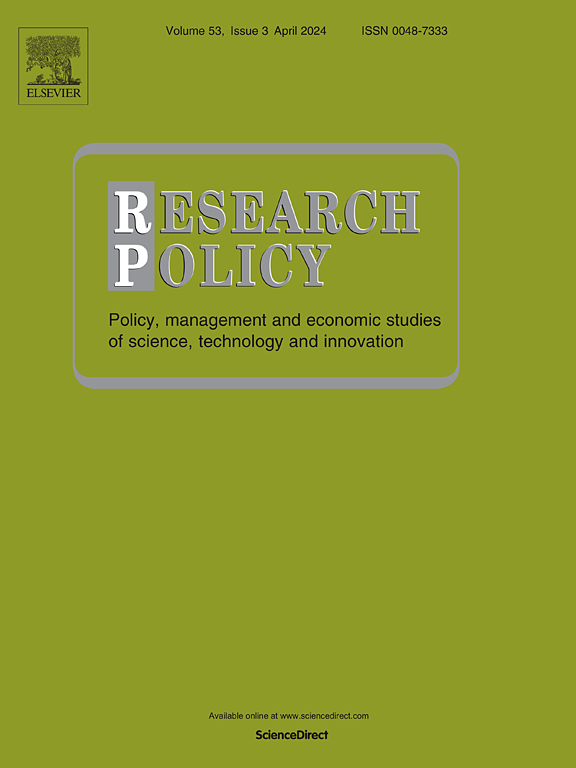创新体系案例研究:悖论、辩证分析和解决方案
IF 7.5
1区 管理学
Q1 MANAGEMENT
引用次数: 0
摘要
本文探讨了有关创新系统(ISs)案例研究科学地位的一个在很大程度上未被注意到的方法论悖论。案例研究在方法论上推动了创新体系方法的产生和确立,是社会科学中使用最广泛的创新理论和政策相关视角之一。然而,许多 ISs 学者认为这类研究不够科学。为了加深我们对案例研究悖论的理解,本文采用了辩证法(又称辩证法),特别是论题(肯定)、反题(否定)和综合(转化)的分析三段论。研究表明,用辩证法解决案例研究悖论涉及三个阶段。首先,分析引入了演绎论题,该论题基于科学的假设-演绎模式,认为关于信息系统的案例研究无法探究因果关系和普遍性。第二步提出了逆推反论,即基于逆推科学模式,认为案例研究本身具有推断因果关系和一般性的能力。第三步,也是最后一步,将演绎论题和逆向反题之间的矛盾转化为一种新的方法论视角,即 "去演绎综合论",根据科学解释模式,案例研究既不能(演绎论题)也能(逆向反题)推断因果关系和一般性。总之,该分析使 IS 学者能够以无悖论、独立、因果解释和可概括的方式开展案例研究。文章最后讨论了对研究实践、同行评审过程和创新政策评估的启示。本文章由计算机程序翻译,如有差异,请以英文原文为准。
Case study research on innovation systems: Paradox, dialectical analysis and resolution
This paper addresses a largely unnoticed methodological paradox regarding the scientific status of case study research on innovation systems (ISs). Case study research has been the methodological catalyst for the genesis and establishment of the ISs approach, as one of the most widely used theoretical and policy-relevant perspectives on innovation in the social sciences. However, many ISs scholars believe that this type of research is not scientific enough. To deepen our understanding of the case study paradox, this paper utilises the dialectical method (also known as dialectics); in particular, the analytical triad of thesis (affirmation), antithesis (negation), and synthesis (transformation). It is shown that a dialectical resolution to the case study paradox involves a three-phase process. First, the analysis introduces the deductive thesis, which, based on the hypothetico-deductive model of science, posits that case study research on ISs cannot investigate causality and generality. The second step formulates the retroductive antithesis, which, based on the retroductive model of science, holds that case study research inherently possesses the ability to infer causality and generality. The third and final phase transforms the contradiction between the deductive thesis and the retroductive antithesis into a new methodological perspective, the detroductive synthesis, wherein – depending on the model of scientific explanation – case study research is both incapable (deductive thesis) and capable (retroductive antithesis) of inferring causality and generality. Overall, the analysis enables IS scholars to conduct case study research in a paradox-free, stand-alone, causal-explanatory, and generalisable way. The paper ends by discussing thought-provoking implications for research practice, the peer-review process, and the evaluation of innovation policies.
求助全文
通过发布文献求助,成功后即可免费获取论文全文。
去求助
来源期刊

Research Policy
MANAGEMENT-
CiteScore
12.80
自引率
6.90%
发文量
182
期刊介绍:
Research Policy (RP) articles explore the interaction between innovation, technology, or research, and economic, social, political, and organizational processes, both empirically and theoretically. All RP papers are expected to provide insights with implications for policy or management.
Research Policy (RP) is a multidisciplinary journal focused on analyzing, understanding, and effectively addressing the challenges posed by innovation, technology, R&D, and science. This includes activities related to knowledge creation, diffusion, acquisition, and exploitation in the form of new or improved products, processes, or services, across economic, policy, management, organizational, and environmental dimensions.
 求助内容:
求助内容: 应助结果提醒方式:
应助结果提醒方式:


